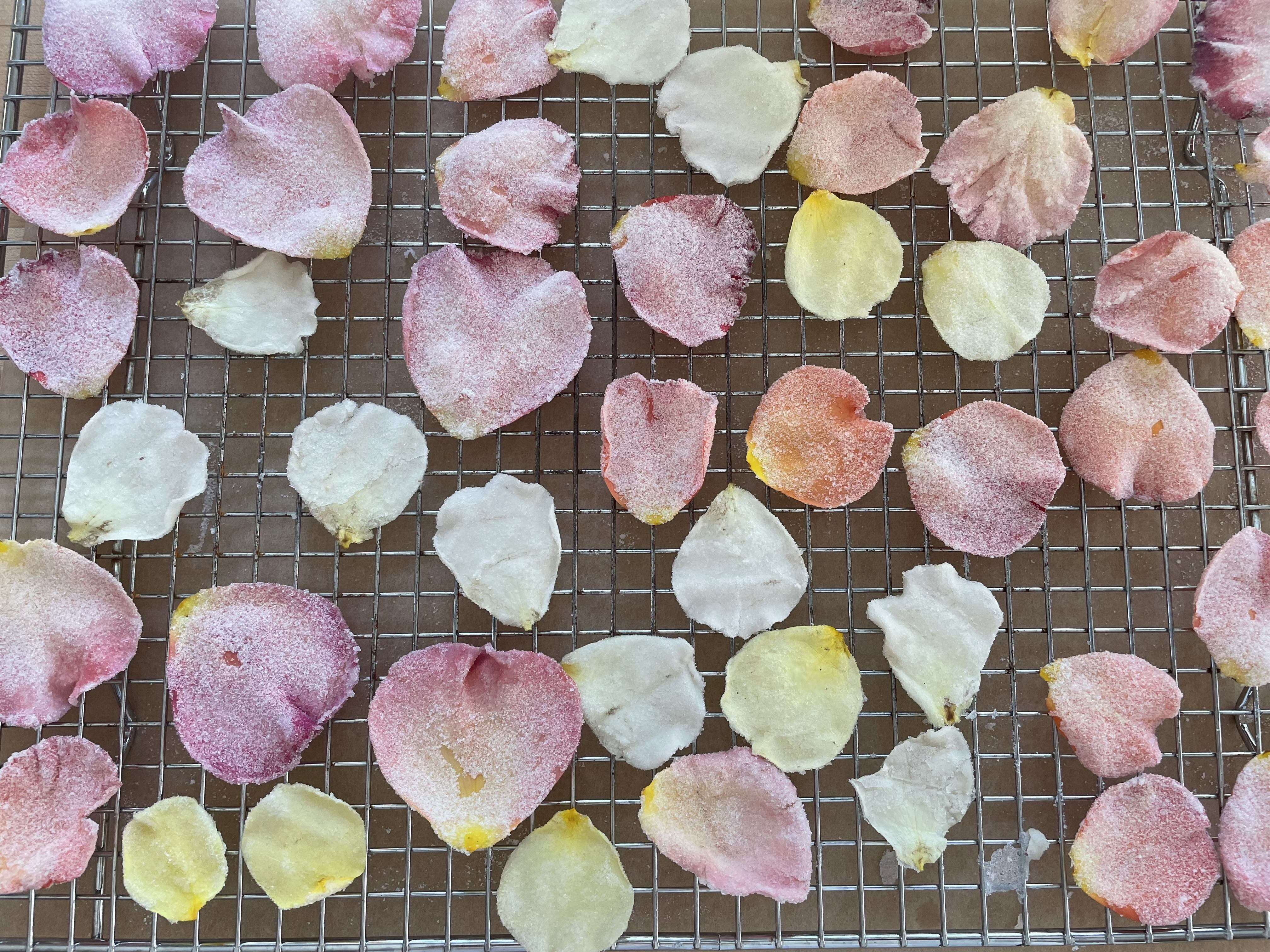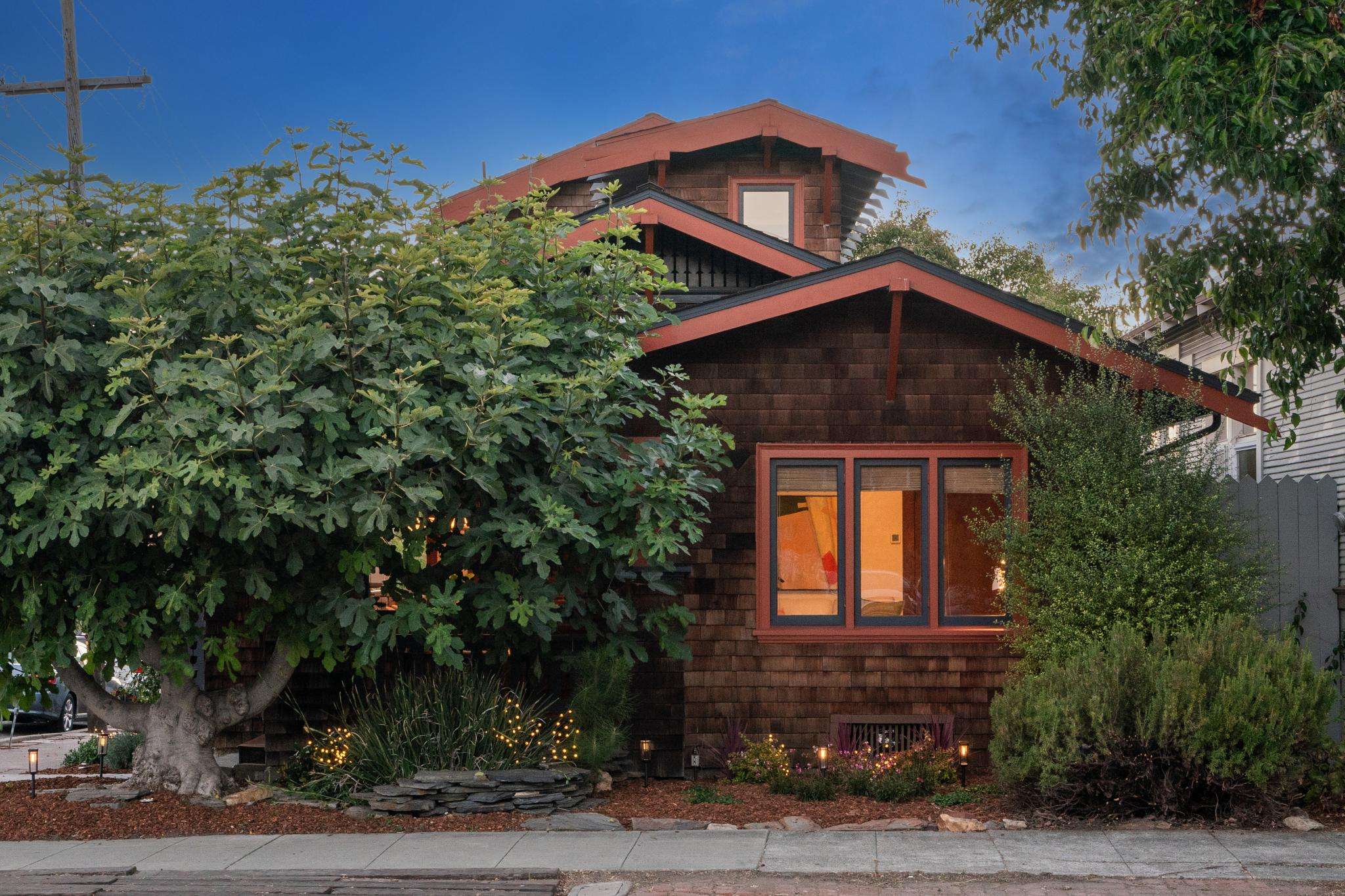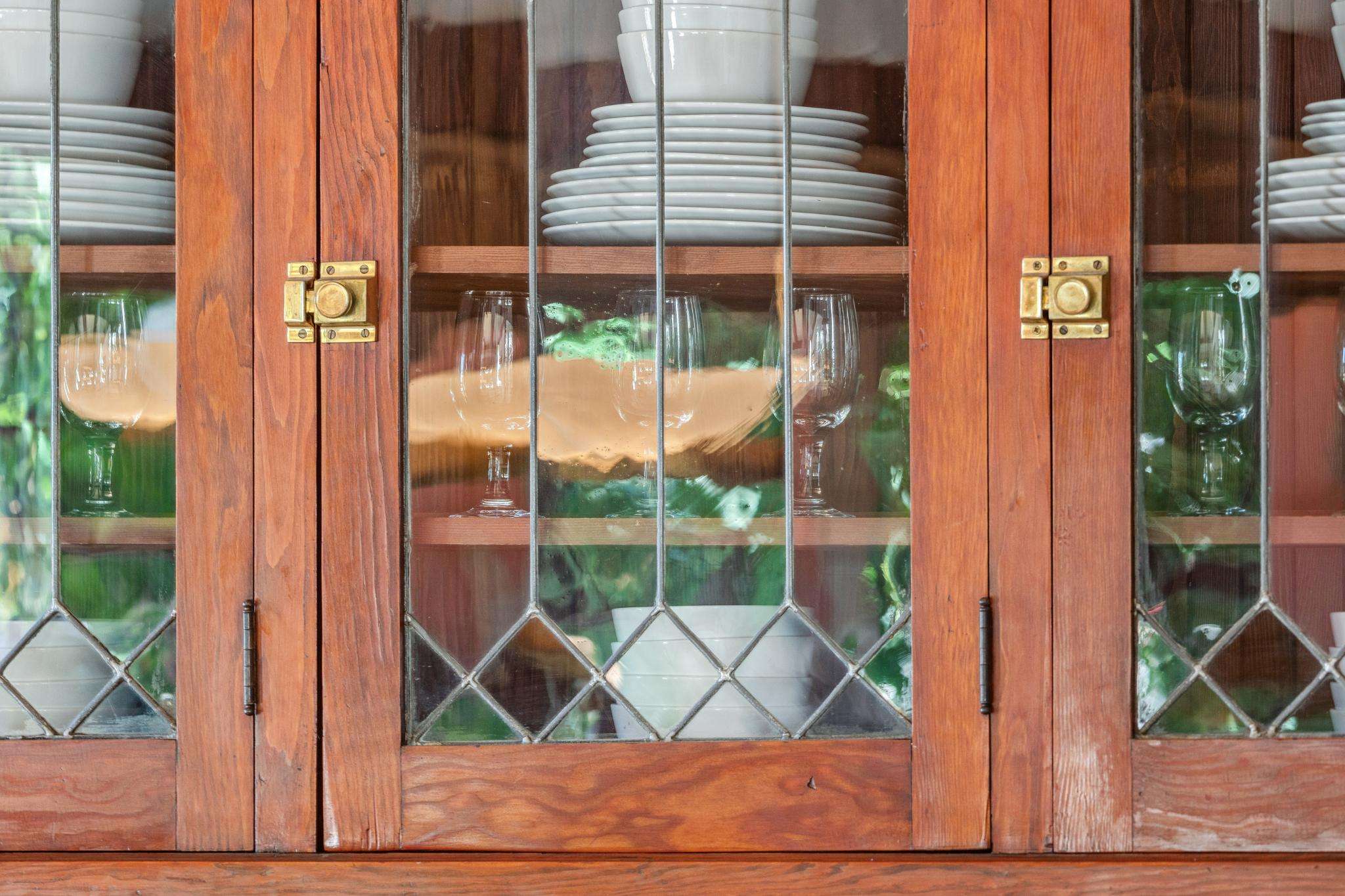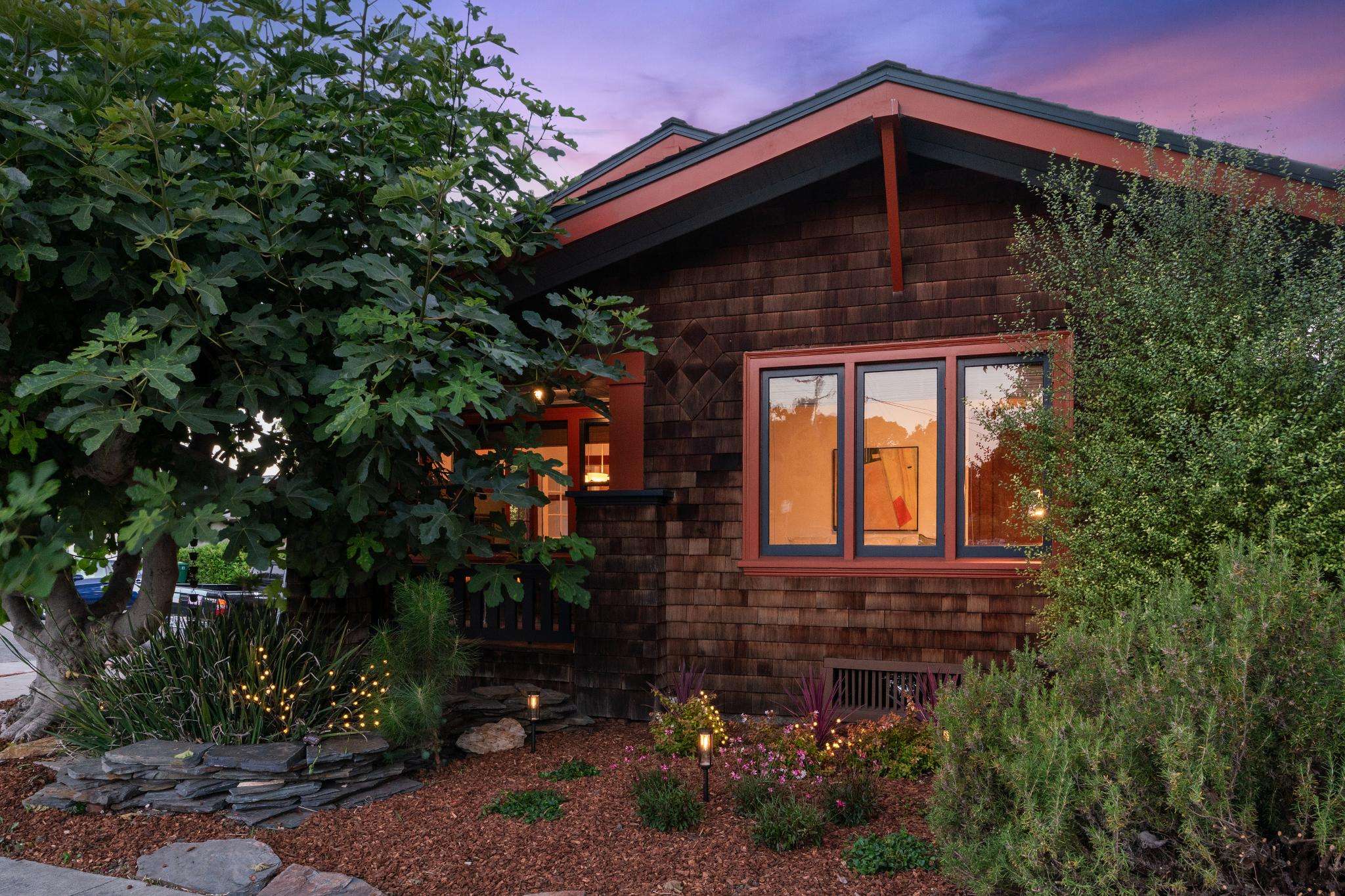Menu

Berkeley Brown-Shingle Gem!
$995,000
1195 Hearst Avenue,
Berkeley
Presented by Corey Weinstein
Features
For the last 35 years, this Berkeley brown-shingle gem has been the much-beloved home of local culinary luminaries. When you enter the house, you can feel that it’s been imbued with their warmth, conviviality, and the generosity of many gatherings. The rooms are full of character, preserving the historic charm and architectural details.
It lives bigger than its size because the spaces flow into the sunny eat-in kitchen and out to the thoughtfully curated garden with heirloom roses, a fig tree (whose leaves have been infused into ice cream at Chez Panisse), lavender, succulents, lemon verbena, and a persimmon tree named “Simone.”
The eat-in kitchen is the heart of this home, and features a Blue Star stove and a Dutch door to invite the outdoors in while you’re cooking. Or, you could bring your ingredients to the outdoor BBQ/smoker and open-hearth grill.
The living room is cozy with a wall of built-in bookshelves and warm, wood floors. The dining room has box-beam ceilings, a true hutch with leaded-glass doors and brass hardware, and a decorative fireplace surrounded by classic Heath tile.
The primary bedroom and vintage-inspired bath feature stained glass windows handmade by a previous owner, and the bath has a large clawfoot tub for deep soaking. Upstairs is a second bedroom, with a view out across town toward the sunset over the Bay.
There’s a detached garage with great storage, and an additional structure the sellers used as an office/studio*. So many amenities are nearby including Bartavelle, Acme Baking, Kermit Lynch wines, restaurants, coffee shops, as well as commute options, parks, and more. It’s not surprising it has a WalkScore of 96® and a BikeScore™ of 100. Every home has stories to share; this one comes with a recipe too!
Features:
*Neither seller nor listing agent has investigated or verified the accuracy of any of these sources of information nor that these spaces are or may be made into legally habitable spaces. Buyer must conduct their own investigation with the city and appropriate professionals and rely solely on that investigation.
It lives bigger than its size because the spaces flow into the sunny eat-in kitchen and out to the thoughtfully curated garden with heirloom roses, a fig tree (whose leaves have been infused into ice cream at Chez Panisse), lavender, succulents, lemon verbena, and a persimmon tree named “Simone.”
The eat-in kitchen is the heart of this home, and features a Blue Star stove and a Dutch door to invite the outdoors in while you’re cooking. Or, you could bring your ingredients to the outdoor BBQ/smoker and open-hearth grill.
The living room is cozy with a wall of built-in bookshelves and warm, wood floors. The dining room has box-beam ceilings, a true hutch with leaded-glass doors and brass hardware, and a decorative fireplace surrounded by classic Heath tile.
The primary bedroom and vintage-inspired bath feature stained glass windows handmade by a previous owner, and the bath has a large clawfoot tub for deep soaking. Upstairs is a second bedroom, with a view out across town toward the sunset over the Bay.
There’s a detached garage with great storage, and an additional structure the sellers used as an office/studio*. So many amenities are nearby including Bartavelle, Acme Baking, Kermit Lynch wines, restaurants, coffee shops, as well as commute options, parks, and more. It’s not surprising it has a WalkScore of 96® and a BikeScore™ of 100. Every home has stories to share; this one comes with a recipe too!
Features:
- Built in 1916
- Berkeley “brown-shingle” Craftsman-style home
- 1,221* sf per measured floor plan by Open Homes Photography
- 3,604 sf lot per public record
- 2 bedrooms
- 1 bath with vintage clawfoot tub
- Detached garage with ample storage
- Additional structure* which the sellers used as a studio/work space/office (Open Homes measured at 85 sf)
- Eat-in kitchen with Blue Star range in British Racing Green
- Dining room with beautiful hutch, box-beamed ceilings, fireplace with Heath tile surround
- Living room with wall of built-in bookshelves and large closet
- Back deck with outdoor cooking area including a Primo BBQ/smoker, open-hearth grill (lined with fire bricks), and quartz countertop
- Gardens with several varieties of heirloom roses, Fuyu persimmon tree, lavender, black mission fig tree, purple bearded iris, lemon verbena, violets, pink geranium, hellebore, rosemary and more
- Hot tub
- WalkScore® of 96; BikeScore™ of 100
*Neither seller nor listing agent has investigated or verified the accuracy of any of these sources of information nor that these spaces are or may be made into legally habitable spaces. Buyer must conduct their own investigation with the city and appropriate professionals and rely solely on that investigation.
3D Virtual Tour
Property Video
Recipe for
Grilled Fig Leaf
Ice Cream
<div style="padding:56.25% 0 0 0;position:relative;"><iframe src="https://player.vimeo.com/video/1066426820?badge=0&autopause=0&player_id=0&app_id=58479" frameborder="0" allow="autoplay; fullscreen; picture-in-picture; clipboard-write; encrypted-media" style="position:absolute;top:0;left:0;width:100%;height:100%;" title="1195_Hearst_IceCream_Video"></iframe></div><script src="https://player.vimeo.com/api/player.js"></script>
Grilled Fig Leaf Ice Cream
This has often been made at Chez Panisse with the leaves from the fig tree at 1195 Hearst
Yields about 1 1/2 quarts
1 1/2 cups half and half
3 cups cream
1 cup sugar
fig leaves
9 egg yolks
ice bath for cooling custard
Choose young fig leaves and remove stems. Using either a hot pizza oven, grill or stove top, grill fig leaves until they begin to curl a bit, turning a purple/ black color. They need to take on color, but be careful not to fully char them. If they go too far, discard them and start over. It may take a couple of times to get the hang of it.
Warm half and half, cream and sugar in a heavy bottomed pot. When the dairy mixture gets hot and steamy (not boiling) plunge a few of the leaves in and let steep for a few minutes. Remove with a flat strainer or slotted spoon. Taste the liquid.
It needs to be a bit strong because you will be adding yolks later and they will dilute the flavor some. Add more fig leaves and continue steeping until you taste that nice bitter almond/coconut flavor. This could take several rounds.
Once you’ve gotten the flavor right, set up your ice bath. Set a metal bowl or metal container over a bowl of ice with a fine strainer set on top. (it can even be another cooking pot. metal cools quicker, and quicker cooling prevents the custard from over cooking)
Heat the liquid again and whisk your yolks together. With some of the hot fig leaf liquid, temper the yolks until they are warm, whisking all the while. Pour the tempered yolks into the fig leaf dairy mixture and cook over medium heat, stirring with a flat sided wooden or heat proof spatula until the mixture reaches 170 degrees, or test by pulling out the spatula and dragging your finger across the custard base on the spatula, it should leave a line.
Immediately pour the cooked ice cream base into the strainer over the chilled bowl. Stir the base until it cools down completely and put in the refrigerator for at least an hour, or until it is very cold to the touch.
At this point, you can spin it in your ice cream freezer, or keep it in the refrigerator for several days until you are ready to spin it. Have a container in the freezer ready to transfer finished ice cream into.
This can be served with fresh figs, roasted figs, fresh raspberries, fresh peaches, plum tart…or any combination of these!
To roast figs, line a crockery dish with washed fig leaves, arrange fig halves on top of the leaves, drizzle with Marsala and sprinkle with sugar. Roast in a very hot oven until the figs bubble and begin to take on color on the edges and stem end. Discard leaves, but use the liquid in the dish to drizzle over the figs. Garnish with toasted walnuts or almonds.
Grilled Fig Leaf Ice Cream
This has often been made at Chez Panisse with the leaves from the fig tree at 1195 Hearst
Yields about 1 1/2 quarts
1 1/2 cups half and half
3 cups cream
1 cup sugar
fig leaves
9 egg yolks
ice bath for cooling custard
Choose young fig leaves and remove stems. Using either a hot pizza oven, grill or stove top, grill fig leaves until they begin to curl a bit, turning a purple/ black color. They need to take on color, but be careful not to fully char them. If they go too far, discard them and start over. It may take a couple of times to get the hang of it.
Warm half and half, cream and sugar in a heavy bottomed pot. When the dairy mixture gets hot and steamy (not boiling) plunge a few of the leaves in and let steep for a few minutes. Remove with a flat strainer or slotted spoon. Taste the liquid.
It needs to be a bit strong because you will be adding yolks later and they will dilute the flavor some. Add more fig leaves and continue steeping until you taste that nice bitter almond/coconut flavor. This could take several rounds.
Once you’ve gotten the flavor right, set up your ice bath. Set a metal bowl or metal container over a bowl of ice with a fine strainer set on top. (it can even be another cooking pot. metal cools quicker, and quicker cooling prevents the custard from over cooking)
Heat the liquid again and whisk your yolks together. With some of the hot fig leaf liquid, temper the yolks until they are warm, whisking all the while. Pour the tempered yolks into the fig leaf dairy mixture and cook over medium heat, stirring with a flat sided wooden or heat proof spatula until the mixture reaches 170 degrees, or test by pulling out the spatula and dragging your finger across the custard base on the spatula, it should leave a line.
Immediately pour the cooked ice cream base into the strainer over the chilled bowl. Stir the base until it cools down completely and put in the refrigerator for at least an hour, or until it is very cold to the touch.
At this point, you can spin it in your ice cream freezer, or keep it in the refrigerator for several days until you are ready to spin it. Have a container in the freezer ready to transfer finished ice cream into.
This can be served with fresh figs, roasted figs, fresh raspberries, fresh peaches, plum tart…or any combination of these!
To roast figs, line a crockery dish with washed fig leaves, arrange fig halves on top of the leaves, drizzle with Marsala and sprinkle with sugar. Roast in a very hot oven until the figs bubble and begin to take on color on the edges and stem end. Discard leaves, but use the liquid in the dish to drizzle over the figs. Garnish with toasted walnuts or almonds.
<div style="padding:56.25% 0 0 0;position:relative;"><iframe src="https://player.vimeo.com/video/1066426820?badge=0&autopause=0&player_id=0&app_id=58479" frameborder="0" allow="autoplay; fullscreen; picture-in-picture; clipboard-write; encrypted-media" style="position:absolute;top:0;left:0;width:100%;height:100%;" title="1195_Hearst_IceCream_Video"></iframe></div><script src="https://player.vimeo.com/api/player.js"></script>
Grilled Fig Leaf Ice Cream
This has often been made at Chez Panisse with the leaves from the fig tree at 1195 Hearst
Yields about 1 1/2 quarts
1 1/2 cups half and half
3 cups cream
1 cup sugar
fig leaves
9 egg yolks
ice bath for cooling custard
Choose young fig leaves and remove stems. Using either a hot pizza oven, grill or stove top, grill fig leaves until they begin to curl a bit, turning a purple/ black color. They need to take on color, but be careful not to fully char them. If they go too far, discard them and start over. It may take a couple of times to get the hang of it.
Warm half and half, cream and sugar in a heavy bottomed pot. When the dairy mixture gets hot and steamy (not boiling) plunge a few of the leaves in and let steep for a few minutes. Remove with a flat strainer or slotted spoon. Taste the liquid.
It needs to be a bit strong because you will be adding yolks later and they will dilute the flavor some. Add more fig leaves and continue steeping until you taste that nice bitter almond/coconut flavor. This could take several rounds.
Once you’ve gotten the flavor right, set up your ice bath. Set a metal bowl or metal container over a bowl of ice with a fine strainer set on top. (it can even be another cooking pot. metal cools quicker, and quicker cooling prevents the custard from over cooking)
Heat the liquid again and whisk your yolks together. With some of the hot fig leaf liquid, temper the yolks until they are warm, whisking all the while. Pour the tempered yolks into the fig leaf dairy mixture and cook over medium heat, stirring with a flat sided wooden or heat proof spatula until the mixture reaches 170 degrees, or test by pulling out the spatula and dragging your finger across the custard base on the spatula, it should leave a line.
Immediately pour the cooked ice cream base into the strainer over the chilled bowl. Stir the base until it cools down completely and put in the refrigerator for at least an hour, or until it is very cold to the touch.
At this point, you can spin it in your ice cream freezer, or keep it in the refrigerator for several days until you are ready to spin it. Have a container in the freezer ready to transfer finished ice cream into.
This can be served with fresh figs, roasted figs, fresh raspberries, fresh peaches, plum tart…or any combination of these!
To roast figs, line a crockery dish with washed fig leaves, arrange fig halves on top of the leaves, drizzle with Marsala and sprinkle with sugar. Roast in a very hot oven until the figs bubble and begin to take on color on the edges and stem end. Discard leaves, but use the liquid in the dish to drizzle over the figs. Garnish with toasted walnuts or almonds.
Grilled Fig Leaf Ice Cream
This has often been made at Chez Panisse with the leaves from the fig tree at 1195 Hearst
Yields about 1 1/2 quarts
1 1/2 cups half and half
3 cups cream
1 cup sugar
fig leaves
9 egg yolks
ice bath for cooling custard
Choose young fig leaves and remove stems. Using either a hot pizza oven, grill or stove top, grill fig leaves until they begin to curl a bit, turning a purple/ black color. They need to take on color, but be careful not to fully char them. If they go too far, discard them and start over. It may take a couple of times to get the hang of it.
Warm half and half, cream and sugar in a heavy bottomed pot. When the dairy mixture gets hot and steamy (not boiling) plunge a few of the leaves in and let steep for a few minutes. Remove with a flat strainer or slotted spoon. Taste the liquid.
It needs to be a bit strong because you will be adding yolks later and they will dilute the flavor some. Add more fig leaves and continue steeping until you taste that nice bitter almond/coconut flavor. This could take several rounds.
Once you’ve gotten the flavor right, set up your ice bath. Set a metal bowl or metal container over a bowl of ice with a fine strainer set on top. (it can even be another cooking pot. metal cools quicker, and quicker cooling prevents the custard from over cooking)
Heat the liquid again and whisk your yolks together. With some of the hot fig leaf liquid, temper the yolks until they are warm, whisking all the while. Pour the tempered yolks into the fig leaf dairy mixture and cook over medium heat, stirring with a flat sided wooden or heat proof spatula until the mixture reaches 170 degrees, or test by pulling out the spatula and dragging your finger across the custard base on the spatula, it should leave a line.
Immediately pour the cooked ice cream base into the strainer over the chilled bowl. Stir the base until it cools down completely and put in the refrigerator for at least an hour, or until it is very cold to the touch.
At this point, you can spin it in your ice cream freezer, or keep it in the refrigerator for several days until you are ready to spin it. Have a container in the freezer ready to transfer finished ice cream into.
This can be served with fresh figs, roasted figs, fresh raspberries, fresh peaches, plum tart…or any combination of these!
To roast figs, line a crockery dish with washed fig leaves, arrange fig halves on top of the leaves, drizzle with Marsala and sprinkle with sugar. Roast in a very hot oven until the figs bubble and begin to take on color on the edges and stem end. Discard leaves, but use the liquid in the dish to drizzle over the figs. Garnish with toasted walnuts or almonds.
Recipe for Candied Rose Petals
Recipe for Candied Rose Petals
The Westerland roses on the north side fence at 1195 Hearst Ave has perfect petals for these
Ingredients
egg white
organic sugar
unsprayed fragrant roses with firm petals
You will also need a small watercolor brush for brushing the whites on the petals. You can also use your finger.
A small cooling rack.
A piece of parchment to place under the cooling rack to catch the extra sugar.
A wide bowl or pie tin to put the sugar in.
Place a small amount of egg white in a small bowl and break it up with a fork. You don’t want to get them foamy, but you want them to be a bit more fluid.
Carefully pick petals off of the roses and make yourself a small pile. Use one hand to hold the petal, this will be your “wet” hand. It will get egg white on it as you are brushing the petals.
Dip the end of the brush with your “dry” hand into the whites, getting a minimal amount on the brush. (Try not to cross over your wet and dry hand, you’ll end up with a sticky sugary mess on both hands.) Too much white will soak into the petal and it becomes saturated. Brush the thinnest amount of white all over the front and back of the petal, covering completely. To test for that, hold the petal up to the light and check for dry spots.
Place the petal into the pan of sugar, and with your dry hand, cover the petal with sugar. You can press down very gently to make sure the bottom is covered in sugar. Pick up the end of the rose petal and place it gently onto the cooling rack. Repeat until you run out of roses (or patience!) and let them sit out to dry completely. Keep away from water and humidity. You can speed up the process of drying by placing the finished petals near a fan.
Once completely dry, store in an airtight container with a little pack of silica gel to keep them crispy and dry. Lasts for several days before they begin to turn a little brown on the edges. (but they still taste good!)
You can enjoy them like little crispy rose chips, or chop, chiffonade or break them up to sprinkle on ice cream, panna cotta, strawberries, peaches, etc.
The Westerland roses on the north side fence at 1195 Hearst Ave has perfect petals for these
Ingredients
egg white
organic sugar
unsprayed fragrant roses with firm petals
You will also need a small watercolor brush for brushing the whites on the petals. You can also use your finger.
A small cooling rack.
A piece of parchment to place under the cooling rack to catch the extra sugar.
A wide bowl or pie tin to put the sugar in.
Place a small amount of egg white in a small bowl and break it up with a fork. You don’t want to get them foamy, but you want them to be a bit more fluid.
Carefully pick petals off of the roses and make yourself a small pile. Use one hand to hold the petal, this will be your “wet” hand. It will get egg white on it as you are brushing the petals.
Dip the end of the brush with your “dry” hand into the whites, getting a minimal amount on the brush. (Try not to cross over your wet and dry hand, you’ll end up with a sticky sugary mess on both hands.) Too much white will soak into the petal and it becomes saturated. Brush the thinnest amount of white all over the front and back of the petal, covering completely. To test for that, hold the petal up to the light and check for dry spots.
Place the petal into the pan of sugar, and with your dry hand, cover the petal with sugar. You can press down very gently to make sure the bottom is covered in sugar. Pick up the end of the rose petal and place it gently onto the cooling rack. Repeat until you run out of roses (or patience!) and let them sit out to dry completely. Keep away from water and humidity. You can speed up the process of drying by placing the finished petals near a fan.
Once completely dry, store in an airtight container with a little pack of silica gel to keep them crispy and dry. Lasts for several days before they begin to turn a little brown on the edges. (but they still taste good!)
You can enjoy them like little crispy rose chips, or chop, chiffonade or break them up to sprinkle on ice cream, panna cotta, strawberries, peaches, etc.
Recipe for Candied Rose Petals
The Westerland roses on the north side fence at 1195 Hearst Ave has perfect petals for these
Ingredients
egg white
organic sugar
unsprayed fragrant roses with firm petals
You will also need a small watercolor brush for brushing the whites on the petals. You can also use your finger.
A small cooling rack.
A piece of parchment to place under the cooling rack to catch the extra sugar.
A wide bowl or pie tin to put the sugar in.
Place a small amount of egg white in a small bowl and break it up with a fork. You don’t want to get them foamy, but you want them to be a bit more fluid.
Carefully pick petals off of the roses and make yourself a small pile. Use one hand to hold the petal, this will be your “wet” hand. It will get egg white on it as you are brushing the petals.
Dip the end of the brush with your “dry” hand into the whites, getting a minimal amount on the brush. (Try not to cross over your wet and dry hand, you’ll end up with a sticky sugary mess on both hands.) Too much white will soak into the petal and it becomes saturated. Brush the thinnest amount of white all over the front and back of the petal, covering completely. To test for that, hold the petal up to the light and check for dry spots.
Place the petal into the pan of sugar, and with your dry hand, cover the petal with sugar. You can press down very gently to make sure the bottom is covered in sugar. Pick up the end of the rose petal and place it gently onto the cooling rack. Repeat until you run out of roses (or patience!) and let them sit out to dry completely. Keep away from water and humidity. You can speed up the process of drying by placing the finished petals near a fan.
Once completely dry, store in an airtight container with a little pack of silica gel to keep them crispy and dry. Lasts for several days before they begin to turn a little brown on the edges. (but they still taste good!)
You can enjoy them like little crispy rose chips, or chop, chiffonade or break them up to sprinkle on ice cream, panna cotta, strawberries, peaches, etc.
The Westerland roses on the north side fence at 1195 Hearst Ave has perfect petals for these
Ingredients
egg white
organic sugar
unsprayed fragrant roses with firm petals
You will also need a small watercolor brush for brushing the whites on the petals. You can also use your finger.
A small cooling rack.
A piece of parchment to place under the cooling rack to catch the extra sugar.
A wide bowl or pie tin to put the sugar in.
Place a small amount of egg white in a small bowl and break it up with a fork. You don’t want to get them foamy, but you want them to be a bit more fluid.
Carefully pick petals off of the roses and make yourself a small pile. Use one hand to hold the petal, this will be your “wet” hand. It will get egg white on it as you are brushing the petals.
Dip the end of the brush with your “dry” hand into the whites, getting a minimal amount on the brush. (Try not to cross over your wet and dry hand, you’ll end up with a sticky sugary mess on both hands.) Too much white will soak into the petal and it becomes saturated. Brush the thinnest amount of white all over the front and back of the petal, covering completely. To test for that, hold the petal up to the light and check for dry spots.
Place the petal into the pan of sugar, and with your dry hand, cover the petal with sugar. You can press down very gently to make sure the bottom is covered in sugar. Pick up the end of the rose petal and place it gently onto the cooling rack. Repeat until you run out of roses (or patience!) and let them sit out to dry completely. Keep away from water and humidity. You can speed up the process of drying by placing the finished petals near a fan.
Once completely dry, store in an airtight container with a little pack of silica gel to keep them crispy and dry. Lasts for several days before they begin to turn a little brown on the edges. (but they still taste good!)
You can enjoy them like little crispy rose chips, or chop, chiffonade or break them up to sprinkle on ice cream, panna cotta, strawberries, peaches, etc.


Corey Weinstein
_copy_thumbnail.jpg?signature=997fc298403dfccff158e7ad8a1c4816abe182aca38f6102f566c06967923b72)
Maria Cavallo-Merrion
Get In Touch
Thank you!
Your message has been received. We will reply using one of the contact methods provided in your submission.
Sorry, there was a problem
Your message could not be sent. Please refresh the page and try again in a few minutes, or reach out directly using the agent contact information below.

Corey Weinstein
_copy_thumbnail.jpg?signature=997fc298403dfccff158e7ad8a1c4816abe182aca38f6102f566c06967923b72)
Maria Cavallo-Merrion
Email Us














